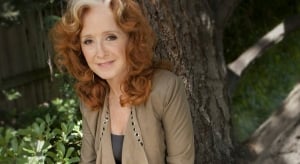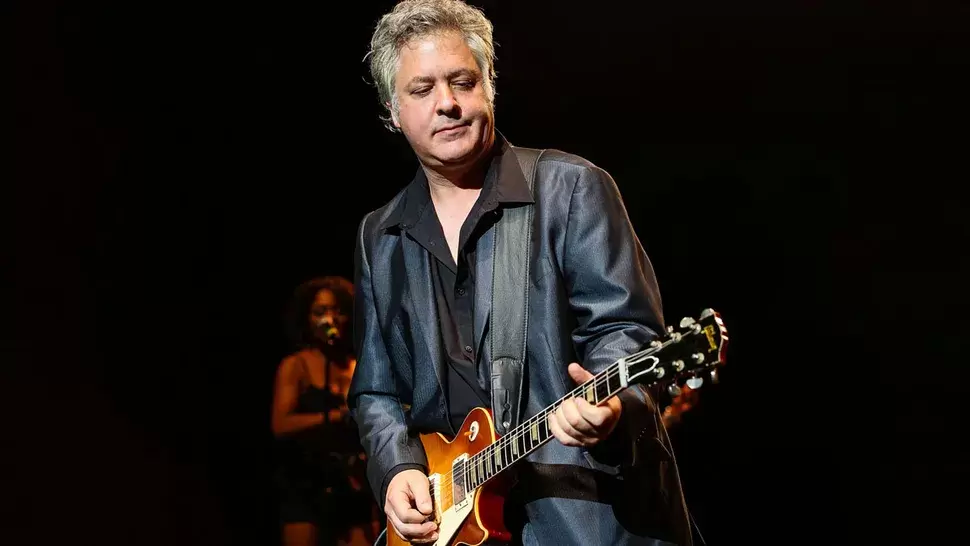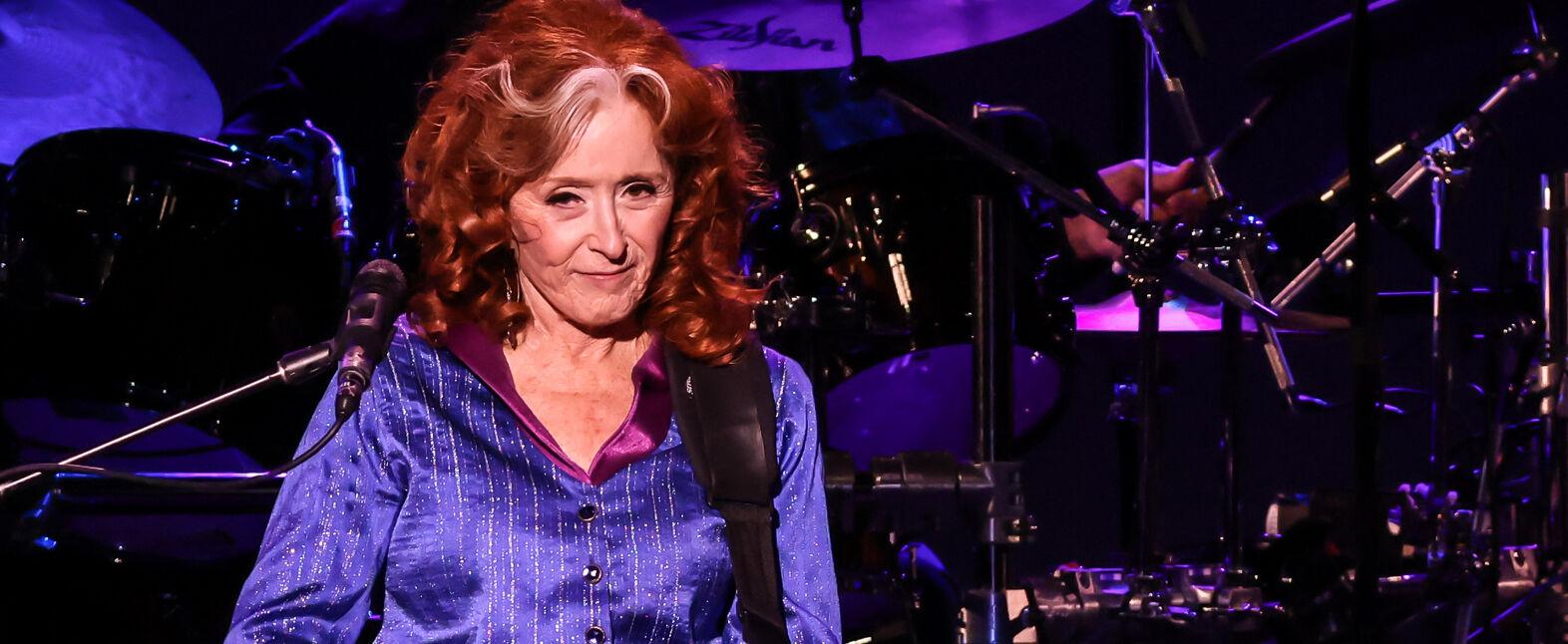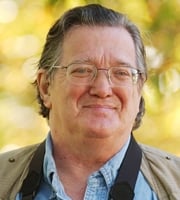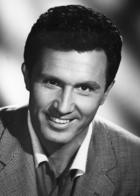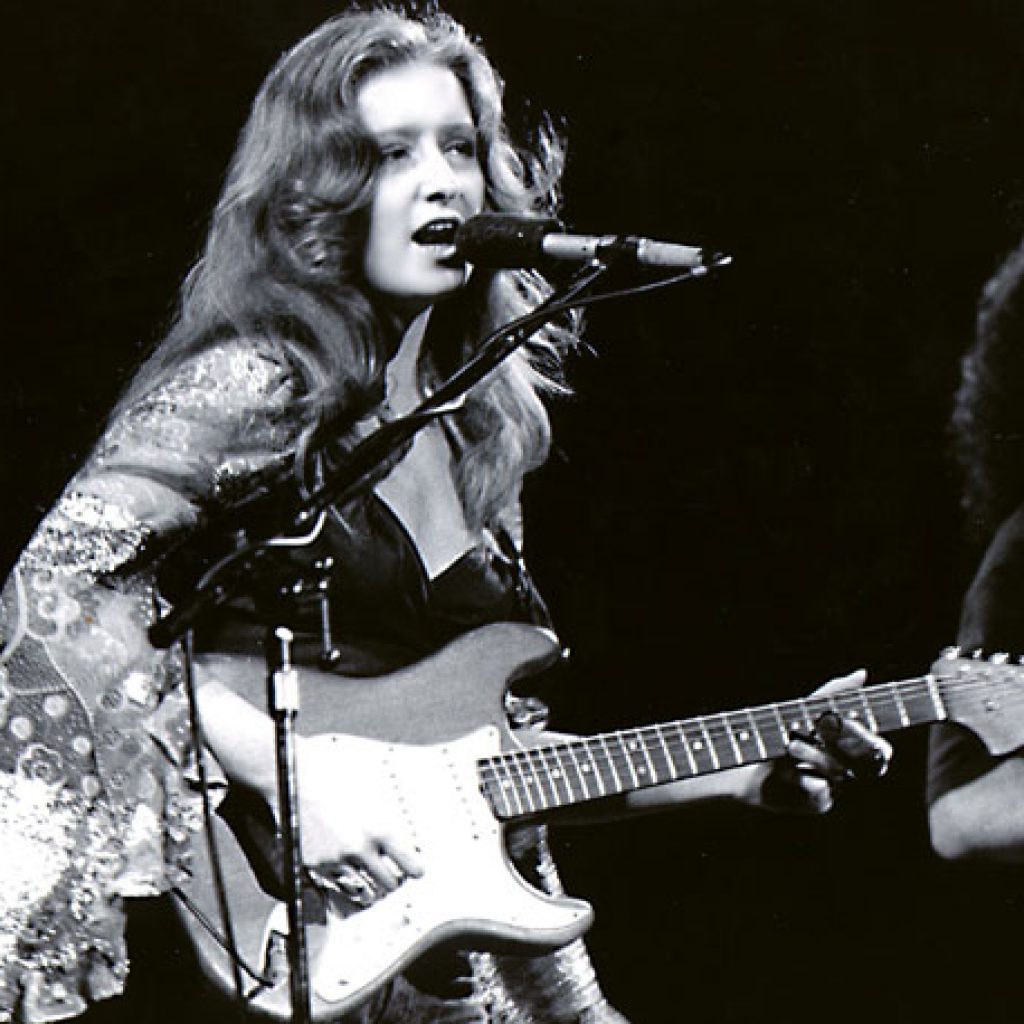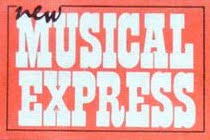

At first sight, Bonnie Raitt isn’t the world’s most startling human being. In fact, she seems pretty damn ordinary. Quiet; medium height; plain; unkempt red hair – the only noticeable thing about her appearance as she dredges her nth scotch is an impressively deep cleavage, which averts the incautious gaze momentarily before a very gruff vocal drawl snaps you to attention.
What the hell, she makes her living from her voice anyhow.
Still, Miss Raitt isn’t what one normally thinks of as red hot marketable product (horrible term); she’s a name in a record rack for browsers, or else a fixture on the intended-to-check-out-but-never-got-round-to-doing-it list. She hasn’t been helped by a set of wrongly synched promotions and a press attitude that has spawned such remarkably irrelevant non-perceptions as “Bonnie Raitt has long red hair and an enthusiasm for music that is almost unfeminine.” Praise like that she can do without.
A browse through her biography might clarify the picture. Brought up in a Los Angeles show business family (dad was John Raitt of Carousel and Pajama Game fame) Bonnie later moved into the Cambridge Massachusetts folk club circuit, where she developed a penchant for roots blues in a variety of styles ranging from those pioneered by Mississippi John Hurt, Fred McDowell, Arthur Crudup and Muddy Waters to her special mentors Howlin’ Wolf and Sippie Wallace. Pretty soon she was playing bottleneck National Steel and recording with Junior Wells and A.C. Reed: all this and barely twenty. Since then her reputation has flowered slowly. Milestones include her Give It Up and Takin’ My Time albums, both notable for the quality of their musicianship and marking her partnership with raw funky dudes John Hall of Orleans and the Lowell George, Bill Payne duo which now sparks Little Feat.
Along the road to full critical acceptance, Bonnie had to overcome the disastrous treading-water period of her Jerry Ragavoy flop Streetlights, and an alarming failure rate on album sales. All this despite her paradoxically strong audience appeal, and a hard core of devotees convinced that one day she would crack it good. Meanwhile numerous interviews concluded that, No, Bonnie wasn’t bothered about being a star even though Home Plate, one of 1975’s better albums, was more than a nod to the contrary.
Now Warner and his several Brothers have brought her to England for a one-off date, a spin on the Earl Grey Woosle Test, and a chance to see if the machine that turned Emmylou Harris into sensational news can work similar wonders with Bonnie’s increasingly more mainstream approach.
At least the visit should help her join the growing breed of female rock persons vying for a sniff at the gravy. She has none of Joni Mitchell‘s aquiline good looks nor, thankfully, any of her earnest high-brow pretensions. She doesn’t play homespun and edible like Emmylou either; and if Ms. Smith springs to mind (as she invariably does in these matters) well, a cult figure Bonnie ain’t. She answers questions straight, keeps her ideals upfront and her real love lies in stage performance.
If it seems incongruous for a white middle-class lady to earn a living singing de blues, she squashes the doubts quick: “I started when I was thirteen. I don’t think it’s any more incongruous than singing soul or rock; there’s very little difference between Smokey Robinson or Robert Johnson, ‘cos blues isn’t just about being poor; it’s about pain and poor people don’t have any corner on pain.
“I mostly liked it for the music, I’d been into Dylan and Joan Baez and yet Mississippi John Hurt or Son House meant more to me. I had to learn how to play, the techniques, but as I get older and more experienced the lyrics have more feeling.”
Not being an expert on these matters I wondered exactly what the word ‘blues’ meant to her.
“If the words say something neat, I like it. I wish I could write easier myself,” (she’s only ever recorded five of her own songs and those on the first two albums) “but I’ve been relatively quiet. It was a personal choice, I didn’t want to live my life and write about it too. Recently I’ve been going around with an old man I really dig and I guess I’m a lot happier.”
It doesn’t need much musical intellect to realise that the majority of what is commercially acceptable, from the emergence of Bo Diddley, through R&B to the melange of today, owes more than a passing debt to numerous unsung influences who’ve never gotten fat off the proceedings. Bonnie Raitt began her career with honesty enough to pay credit, acknowledge dues and return favours. She is strictly on the level:
“I don’t want to sound like a crusader, but growing up in a privileged family and being around a lot of real jive values—cats’ driving Rolls Royces—I can speak about it. I grew up with that so I don’t need to be a star, I think it’s bullshit. Also being a pacifist with Quaker ethics…I just want to make a living and throw something back into the community rather than buying a new pair of racing gloves for my Ferrari.”
Most of her seminal influences remain in sad obscurity. A lot of the definitive old bluesers lived cliched no-joke lives. A lot of them died like that too. Mance Lipscomb, Hound Dog Taylor, Howlin’ Wolf, Paul Robeson, Jesse Fuller, who all played their part in shaping either her musical or moral outlook have recently died.
“Those deaths hit me hard, especially Wolf and Hound Dog. My manager, Dick Waterman, rediscovered Son House and looked after Fred McDowell and Arthur Crudup.” Bonnie speaks almost reverently. “He knew Mance well. If you’re young and doing blues you owe it to help them financially, but there’s no way to get obscure label stuff distributed.
“I appreciated those guys accepting me as a peer and now I headline I can get them on the bill in front of more people. I’m not a missionary but I want to get them back some money, get them recording now instead of articles in Rolling Stone after they’re dead. Ironically, the black kids prefer The Jackson Five to B.B. King, who represents the South, and poverty. It’s the white kids who pick up on that angle.”
Bonnie Raitt can’t be accused of not doing her bit to remedy this situation. In a world where most rock stars develop monster egos, take the money and run like hell for the nearest chateau she gives some back.
“People send me requests for benefits. I make enough money to support the band so I do, say, 10 free gigs for listener-sponsored stations and try to break the AM playlist that prevents them getting heard. We play shows for day-care centres, women’s groups; when the war was on we helped the Inter-China Peace Campaign, but I don’t have anything to do with real radical politics.” Which may be so, though along with Maria Muldaur, Jackson Browne and Linda Ronstadt she is involved in promoting Tom Hayden’s Californian election fight. Hayden you’ll remember, was one of the Chicago conspiracy trial defendants.
With the necessarily capitalist set-up at all big record companies, her perseverance could seem anomalous. How does she reconcile socialist sympathies with being part of the snow ball? Once caught up in the machine, ideals are frazzled so fast that they come out the other end smelling as sweet as everything else. Or else you can get lost:
“Warner Communications owns everything, but everything—records, magazines, comics, T.V., movies. Rock stars really could get men into the White House, it’s frightening. See, Gregg Allman supports Jimmy Carter (a genuine redneck) so every kid who drinks beer and likes the Allmans will vote for him. If Dylan endorsed someone, well, he’s got a lot of influence…
“Maybe that’s dangerous.”
Bonnie shrugs, swigs again and motions towards her band who are sitting at a table near the bar, drinking red wine and reading American newspapers. They look a pretty anonymous bunch, silent, morose and reluctant to explore the twilight pleasures of freezing Earls Court on a dismal Thursday. Some hail from L.A. Bassman Daniel ‘Freebo’ Friedberg is an eminent sessioner, once part of Philadelphia’s Edison Lighthouse (a band that also spawned Mark Jordan and drummer Rip Stock, well known for their work with Van Morrison and the Chambers Brothers respectively). Freebo has been Bonnie’s most consistent companion on the road for five years, starting off with her in Cambridge when they supported everyone from old folkies to the Chicago influenced raunch of J. Geils.
When they’d drunk themselves to a creative hangover they split for California, where they met up with Little Feat, John Hall and a more convivial atmosphere: “Cambridge was so small, people resented me. I’d read ‘guess who was found under the table again’.”
Home Plate reveals a confidence in the conglomeration of styles, the sort of pinnacle to a career which should move her, at twenty-six, into the bracket reserved for the Mitchells and Collins of this world. A culmination of five years work, from a sordid Minnesota garage where she laid down the breaks with A.C. Reed and Junior Wells to a fruitful liaison with ex-Elektra master producer Paul Rothchild. But Bonnie hums and even haws:
“There’s not enough bottom on it. Paul had never seen me…I’d heard of him, of course. He did Janis Joplin’s last album, which I’m not really into, but he’s good at working with lead singers who drink, I guess.” She laughs.
“Jim Morrison, Janis Joplin and me. He’s also producing the Outlaws and getting rich.” Groans.
Raitt has the comfort of knowing that if she never makes the planet reel on its axis, she has at least provided a launching pad for promising unknowns such as Jackson Browne, Eric Kaz and John Prine. She may not be the female equivalent of Tom Rush but a woman with taste nevertheless:
“Some people write ’em, some people pick ’em. Now I’m peers with guys like Tom and Joni,” (she calls everyone ‘guys’ regardless of sex, this can be confusing) “but I never thought I’d share stages with them…aw shucks.”
Well, integrity and equality are fine terms to bandy about but they don’t get your bits of plastic whirling on the decks of a nation. If you got a message you don’t necessarily want to keep it to yourself:
“Of course, I’m not exactly famous, my records do O.K. but having a hit single would be a problem for me. Emmylou has a style which everyone is just going to like. I have enough audience for it not to matter.” Low-key determination, it’s worked before and in an era of giant hype Bonnie Raitt could make it work again:
“There’s a process of planned obsolescence in rock music, you get your picture on the front cover of Time, like Springsteen, you’re big for two years, then no-one wants to know you any more.
“This is supposedly the year of women in rock, but where the hell do people think we’ve been all this time?”





 Visitors Today : 5
Visitors Today : 5 Who's Online : 1
Who's Online : 1






